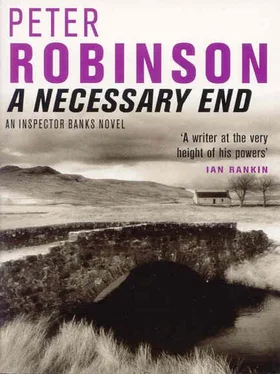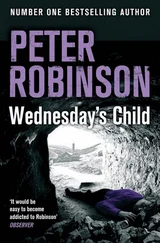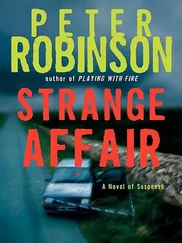Peter Robinson - A Necessary End
Здесь есть возможность читать онлайн «Peter Robinson - A Necessary End» весь текст электронной книги совершенно бесплатно (целиком полную версию без сокращений). В некоторых случаях можно слушать аудио, скачать через торрент в формате fb2 и присутствует краткое содержание. Год выпуска: 1989, ISBN: 1989, Издательство: Avon, Жанр: Полицейский детектив, на английском языке. Описание произведения, (предисловие) а так же отзывы посетителей доступны на портале библиотеки ЛибКат.
- Название:A Necessary End
- Автор:
- Издательство:Avon
- Жанр:
- Год:1989
- ISBN:9780330514729
- Рейтинг книги:5 / 5. Голосов: 1
-
Избранное:Добавить в избранное
- Отзывы:
-
Ваша оценка:
- 100
- 1
- 2
- 3
- 4
- 5
A Necessary End: краткое содержание, описание и аннотация
Предлагаем к чтению аннотацию, описание, краткое содержание или предисловие (зависит от того, что написал сам автор книги «A Necessary End»). Если вы не нашли необходимую информацию о книге — напишите в комментариях, мы постараемся отыскать её.
A Necessary End — читать онлайн бесплатно полную книгу (весь текст) целиком
Ниже представлен текст книги, разбитый по страницам. Система сохранения места последней прочитанной страницы, позволяет с удобством читать онлайн бесплатно книгу «A Necessary End», без необходимости каждый раз заново искать на чём Вы остановились. Поставьте закладку, и сможете в любой момент перейти на страницу, на которой закончили чтение.
Интервал:
Закладка:
"We don't know yet," Burgess said, picking up his pint of Watney's. "Anywhere quiet the chief inspector and I can have a little chat? Police business."
"Aye, you can use the snug. There's no one in there."
The snug was aptly named. Hidden away behind a partition of smoked glass and dark wood, there was room for about four people, and even that would be a tight squeeze.
Banks and Burgess made themselves comfortable, both of them practically draining their drinks before even reaching for smokes.
"Have a cigar," Burgess said, offering his tin.
"Thanks." Banks took one. He didn't enjoy cigars as a rule, but thought that if he tried them often enough he might eventually come to like them.
"And I think I'd better get a couple more drinks in before we start," Burgess said. "Thirsty work, this."
He was back in a moment carrying another pint of bitter for Banks and, this time, a pint of draught Guinness for himself.
"Right," he said, "I can tell you're not happy about this. Don't clam up on me, Banks. What's bothering you?"
"Let's take it at face value, for a start," Banks suggested. "Then maybe we can see what's wrong."
"Suicide?"
"Yes."
"But you don't think so?"
"No. But I'd like to play it through and see if I can pin down my ideas."
"All right. Cotton murdered Gill, then he was overcome with remorse and slit his ankles. Case closed. Can I go back to London now?"
Banks smiled. "But it's not as simple as that, is it? Why would Cotton murder PC Gill?"
Burgess ran a hand through his greying, Brylcreemed hair. "Bloody hell, I thought we'd been through all this before. We're talking about a political crime; call it an act of terrorism. Motive as such doesn't apply."
"But Seth Cotton was perhaps the least political of the lot of them," Banks argued. "Except maybe for Mara, or Zoe Hardacre. Sure, he was anti-nuclear, and he no doubt believed in social equality and the evils of apartheid. But so do I."
Burgess sniffed. "You might be the murder expert around here, but I know about terrorism. Believe me, anyone can get involved. Terrorists play on people's ideals and warp them to their own ends. It's like the brainwashing religious cults do."
"Do you think Gill's death was calmly planned and executed, or was it a crime of passion?" Banks asked.
"A bit of both. Things aren't so clear-cut in this kind of crime. Terrorists are very emotional about their beliefs, but they're cold and deadly when it comes to action."
"The only thing Seth Cotton cared passionately about was his carpentry, and perhaps Mara. If he did commit suicide, I doubt it was anything to do with politics."
"We have his note, don't forget. It's a confession."
"Let's leave that for later. Why did he kill himself? If he's the kind of person you're trying to make out he is, why would he feel remorse after succeeding in his aim? Why would he kill himself?"
Burgess doodled in the foam of his Guinness. "You expect too many answers, Banks. As often as not, there just aren't any. Can't you leave it at that?"
Banks shook his head and stubbed out the cigar. It tasted like last week's tea-leaves. He swigged some more Black Sheep bitter to get rid of the taste and lit a Silk Cut. "It's because there's too many questions," he said. "We still don't know much about Cotton's political background before he came to the farm, though if there'd been any subversive activity I'm sure Special Branch would have a record of it. And what about his behaviour over the last few days? How do you read that?"
"They said he seemed happy when Boyd was released. Is that what you mean?"
"Partly."
"Well, of course he'd be happy," Burgess said. "If he knew the kid wasn't guilty."
"Why should he care? It'd be better for a coldblooded terrorist to let someone else go down for what he'd done. So why kill himself?"
Burgess shrugged. "Because he knew we'd get to him soon."
"So why didn't he just disappear? Surely his masters would have taken care of him in Moscow or Prague or wherever."
"More likely Belfast. But I don't know. It's not unusual for suicides to appear happy once they've decided to end it all."
"I know that. I'm just not sure that he was happy because he'd decided to kill himself."
Burgess grunted. "What's your theory, then?"
"That he was killed, and it was made to look like a suicide."
"Killed by who?"
Banks ignored the question. "We won't know anything for certain until the doc does his post-mortem," he said, "but there's a few things that bother me about the note."
"Go on."
"It just doesn't ring true. The damn thing's neither here nor there, is it? Cotton confesses to killing Gill, but doesn't say why. All he says is, 'I don't know what came over me.' It doesn't square with what we know of him."
"Which is?"
"Precious little, I admit. He was a closed book. But I'd say he was the kind who'd either not bother with a note at all, or maybe he'd explain everything fully. He wouldn't come out with such a wishy-washy effort as the one we saw. I think he'd have used Gill's number, too, not his name. And I don't know if you had a good look, but it seemed very different from that business letter on the desk. The pressure on the characters was different, for a start."
"Yes," Burgess said, "but don't forget the state of mind he must have been in when he typed it."
"I'll grant you that. Still… and the style. Whoever wrote that suicide note had only very basic writing skills. But the business letter was more than competent and grammatically correct."
Burgess slapped the table. "Oh, come on Banks! What's the problem? Is it too easy for you? Business letters are always written in a different style; they're always a bit stuffy and wordy. You wouldn't write to a friend the same way you would in a business letter, would you, let alone a suicide note. A man writing his last words doesn't worry about grammar or how much pressure he puts on each letter."
"But that's just it. Those things are unconscious. Someone used to writing well doesn't immediately become sloppy just because he's under pressure. If anything, I'd have expected a more carefully composed message. And you don't think about how each finger hits the keys when you're typing. It's something you just do, and it doesn't vary much. Why leave it over in the typewriter, too? Why didn't he put it on the bench in front of him?"
"And what I'm saying," Burgess argued, "is that his state of mind could account for all your objections. He must have been disturbed. Contemplation of suicide has an odd effect on a man's character. You can't expect everything to be the same as usual when a bloke's on the verge of slitting his bloody ankles. And remember, you said he'd tried that before."
"That is a problem," Banks agreed. "Whoever did it must have known about the previous attempt and copied it to make it look more like a genuine suicide."
"That's assuming somebody else did it. I'm not sure I agree."
Banks shrugged. "Well see what forensic says about the note. But I'm not happy with it at all."
"What about the bureau?"
"What about it?"
"He'd obviously just finished it, hadn't he? The coat of varnish was still fresh. And he'd moved it to the corner of the workshop. Doesn't that imply anything?"
"That he was tidying things up behind him, you mean? Tying up loose ends?"
"Exactly. Just like a man on the point of suicide. He finished his last piece of work, put it carefully aside so he wouldn't get blood all over it, then he slit his fucking ankles. When he got weak and passed out, he hit his head on the vice, accounting for the head wound."
Banks stared into the bottom of his glass. "It could have happened that way," he said slowly. "But I don't think so."
"Which brings us back to the big question again," Burgess said. "If we're to follow your line of reasoning, if you are right, then who killed him?"
Читать дальшеИнтервал:
Закладка:
Похожие книги на «A Necessary End»
Представляем Вашему вниманию похожие книги на «A Necessary End» списком для выбора. Мы отобрали схожую по названию и смыслу литературу в надежде предоставить читателям больше вариантов отыскать новые, интересные, ещё непрочитанные произведения.
Обсуждение, отзывы о книге «A Necessary End» и просто собственные мнения читателей. Оставьте ваши комментарии, напишите, что Вы думаете о произведении, его смысле или главных героях. Укажите что конкретно понравилось, а что нет, и почему Вы так считаете.












